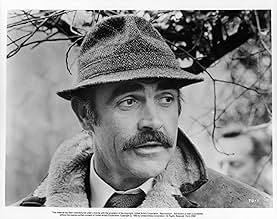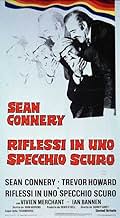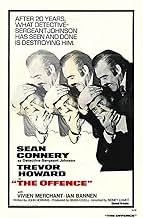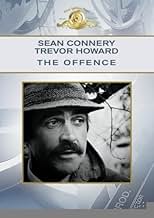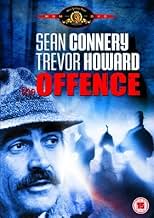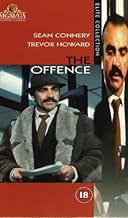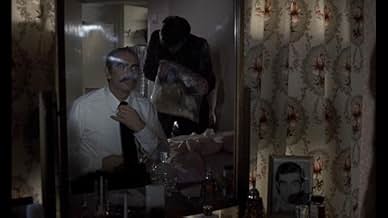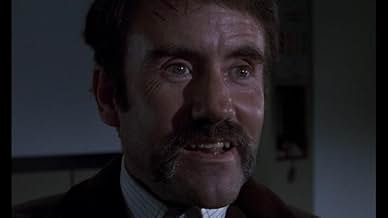IMDb RATING
6.9/10
8.8K
YOUR RATING
A burnt-out British police detective finally snaps whilst interrogating a suspected child molester.A burnt-out British police detective finally snaps whilst interrogating a suspected child molester.A burnt-out British police detective finally snaps whilst interrogating a suspected child molester.
- Nominated for 1 BAFTA Award
- 1 nomination total
John Cannon
- Police Constable
- (uncredited)
Les Conrad
- Detective
- (uncredited)
Timothy Craven
- Ambulance Man
- (uncredited)
Featured reviews
Sean Connery is more a superstar than an actor. Although his talents have been recognised by the Academy (for his rather unconvincing turn as an Irish cop in The Untouchables (1987)) and remembered for his role as the first James Bond, he is high up on his own pedestal, a gift for voice actors and one of the handsomest faces ever to have graced the screen. But anyone in doubt of his ability as a proper thespian need look no further than his grim, tormented portrayal of a cop who has seen one too many dead bodies in Sidney Lumet's The Offence, a huge flop at the box office and a film now faded into memory, ripe for a re-discovery.
Playing with time Rashomon (1950)-style, the film begins in slow motion, where an unknown disturbance at a police station has a few officers panicked. It is revealed to be Detective Sergeant Johnson (Connery) standing over the bloodied body of suspect Kenneth Baxter (Ian Bannen), with fellow police officers scattered on the floor. It then goes back, and we are in a grey, miserable city gripped in panic as a child-killing paedophile roams free. The latest disappearance of a young girl has Johnson riled, and officers cruising the street pick up Baxter, who is wandering alone in the night covered in mud. The young girl is found raped but alive by Johnson himself, who insists on spending some time alone with the suspect.
Based on John Hopkins' stage play This Story of Yours, Connery fought tooth-and-nail to adapt it for the big screen, eventually reprising his role as Bond in Diamond Are Forever (1971) in return for the green-light. Although the film consists of long, talky scenes, Lumet uses stylish editing in order to avoid being stagy and to delve further into his anti-hero's head. His reputation as a no- nonsense director betrays him here, as scenes of gruesome murders, body parts, and a host of other atrocities Johnson has witnessed flash before our eyes. The use of slow motion in the flashback moments also employs a sort of circular filter at the centre of the screen, reflecting Johnson's disconnection from his actions but getting slightly tiresome in the process.
There are three long, outstanding scenes. The first is Johnson returning home to his wife (Vivien Merchant) following his interrogation of Baxter, drinking heavily and exploding at the one person who could possibly help him. The second is Johnson's own interrogation with superintendent Cartwright (the ever-excellent Trevor Howard), a man who has witnessed the same level of horror himself, but has learnt to separate his work from his life, something Johnson is unable to do. The third is the extended interrogation of Baxter, where Bannen's creepy turn surely must have been an inspiration for the Joker-Batman verbal showdown in The Dark Knight (2008). It's incredibly bleak stuff, but the raw honesty of the script and performances makes this powerful stuff.
www.the-wrath-of-blog.blogspot.com
Playing with time Rashomon (1950)-style, the film begins in slow motion, where an unknown disturbance at a police station has a few officers panicked. It is revealed to be Detective Sergeant Johnson (Connery) standing over the bloodied body of suspect Kenneth Baxter (Ian Bannen), with fellow police officers scattered on the floor. It then goes back, and we are in a grey, miserable city gripped in panic as a child-killing paedophile roams free. The latest disappearance of a young girl has Johnson riled, and officers cruising the street pick up Baxter, who is wandering alone in the night covered in mud. The young girl is found raped but alive by Johnson himself, who insists on spending some time alone with the suspect.
Based on John Hopkins' stage play This Story of Yours, Connery fought tooth-and-nail to adapt it for the big screen, eventually reprising his role as Bond in Diamond Are Forever (1971) in return for the green-light. Although the film consists of long, talky scenes, Lumet uses stylish editing in order to avoid being stagy and to delve further into his anti-hero's head. His reputation as a no- nonsense director betrays him here, as scenes of gruesome murders, body parts, and a host of other atrocities Johnson has witnessed flash before our eyes. The use of slow motion in the flashback moments also employs a sort of circular filter at the centre of the screen, reflecting Johnson's disconnection from his actions but getting slightly tiresome in the process.
There are three long, outstanding scenes. The first is Johnson returning home to his wife (Vivien Merchant) following his interrogation of Baxter, drinking heavily and exploding at the one person who could possibly help him. The second is Johnson's own interrogation with superintendent Cartwright (the ever-excellent Trevor Howard), a man who has witnessed the same level of horror himself, but has learnt to separate his work from his life, something Johnson is unable to do. The third is the extended interrogation of Baxter, where Bannen's creepy turn surely must have been an inspiration for the Joker-Batman verbal showdown in The Dark Knight (2008). It's incredibly bleak stuff, but the raw honesty of the script and performances makes this powerful stuff.
www.the-wrath-of-blog.blogspot.com
To me "The offence" is a must. I think this film deserves to be rediscovered and reaprecciated, because it shows two giants of the cinema at their peak.
Actually the film stars Sean Connery -here in his first role after quitting the official James Bond series-, he's directed by his long time friend Sidney Lumet, one of the most talented American directors. The movie is like a theatrical piece, there's not much action. Everything stands on the actors and their expressions, the atmosphere is dark and depressing. But this is is the goal of the story. Sean is a 40 years old policeman, who faces again with a case of child abuse. He's used to deal with the most miserable stories of humanity... But this time his rage and frustrations explode: he beats a suspected person (Ian Bannen) and loses the control, he kills him. He's suspended from the service.
The movie is a psychological study of a hard man, who loses his dignity and understands too late he's a disturbed man as well. "The offence" is a small British film, a big contrast to the lavish 007 productions. We have not a hero here, we have an actor who proves once more to be a wonderful performer -here the desperation of his character is really deep.
In 1972 the movie didn't enjoy a big success, it has been revalued with the time. (maybe the story was too sad and disturbing for being a hit). Today it's considered a milestone in Connery's career. Of course it is.
Actually the film stars Sean Connery -here in his first role after quitting the official James Bond series-, he's directed by his long time friend Sidney Lumet, one of the most talented American directors. The movie is like a theatrical piece, there's not much action. Everything stands on the actors and their expressions, the atmosphere is dark and depressing. But this is is the goal of the story. Sean is a 40 years old policeman, who faces again with a case of child abuse. He's used to deal with the most miserable stories of humanity... But this time his rage and frustrations explode: he beats a suspected person (Ian Bannen) and loses the control, he kills him. He's suspended from the service.
The movie is a psychological study of a hard man, who loses his dignity and understands too late he's a disturbed man as well. "The offence" is a small British film, a big contrast to the lavish 007 productions. We have not a hero here, we have an actor who proves once more to be a wonderful performer -here the desperation of his character is really deep.
In 1972 the movie didn't enjoy a big success, it has been revalued with the time. (maybe the story was too sad and disturbing for being a hit). Today it's considered a milestone in Connery's career. Of course it is.
Arguably the best of Sidney Lumet's British films, this one benefits from a brilliant script by John Hopkins and a tour-de-force performance by Sean Connery as a cop who's been pushed too far. The interrogation scenes between him and an excellent Ian Bannen, as the prime suspect in a child molestation case, are riveting. Hopkins' dialogue is uncannily subtle in its gradual illumination of the psychological states of its two antagonists. Vivien Merchant is exceptional as Connery's emotionally-drained spouse. Gerry Fisher's cold, muted photography perfectly captures the sterility and bleakness of post-modern England. This is not a fun film, but its truths about the fragility of the human psyche are eloquently conveyed.
The Offence is directed by Sidney Lumet and adapted to screenplay by John Hopkins from his own play titled This Story of Yours. It stars Sean Connery, Ian Bannen, Trevor Howard and Vivien Merchant. Cinematography is by Gerry Fisher and music by Harrison Birtwistle.
Detective Sergeant Johnson (Connery) has been with the British Police Force for two decades, in that time he has been witness to countless murders, rapes and other serious crimes. The images, the people he has had to deal with, have left a terrible mark on him. When suspected child sex attacker Kenneth Baxter (Bannen) comes up for interrogation by Johnson, his mind starts to fracture and he loses control, unleashing a dark side that comes out both physically and mentally.
You wouldn't think it possible for Lumet and Connery to have a hidden gem in their respective career outputs, but The Offence is very much just that. An unnerving skin itcher with an upsetting narrative core, The Offence was a commercial flop. It barely got released across the globe and only found its way onto home format release in the last 10 years. The film only got made after Connery struck a deal with United Artists, he would only return as James Bond for Diamonds Are Forever if they backed him for a couple of projects. One of which was The Offence, so with free licence to play Johnson, and his choice of Lumet in the directing chair, Connery got the film made.
Set with a bleak concrete back drop of a "New Town" (cheaply built monstrosities the government knocked up to ease the housing issues), The Offence is a fascinating blend of police procedural and psychological drama. It poses many questions, and thrives on ambiguity to the point repeat viewings are a must, but in the main what shrieks out is the thematic point of one mans harrowing employment taking its toll on he himself. Is it possible that you can only chase and be amongst monsters yourself for so long before you become one of that number? It's invariably hard to recommend the film as high entertainment, a comfy night in by the fire this film is not. But as film art, a searing character study and acting supreme, it scores impressively high whilst tantalisingly tickling the cranium.
It's fair to say it's very dialogue heavy, and Lumet as polished a director as he is, keeps it grainy, revelling in the bleakness of the story. Connery has never been better, utterly compelling, a brooding force of nature and as committed to role as he has ever been. Nor, too, arguably, has Bannen, the scenes shared between the two men are lessons in acting as they portray two warped minds bouncing off each with an unsettling force that grips us round the throat and refuses to let go long after the credits have rolled. Howard steps in to add a touch of mature quality, he too bringing the best out of Connery in the scenes they share, while Merchant as Johnson's "on the outside" wife, is raw and heartfelt.
You can't pigeon hole The Offence, it's very much one of a kind and it demands to be tracked down by serious film fans. From the low key score and foreboding 70s setting, to the gripper of a denouement, The Offence is an essential piece of British cinema. 9.5/10
Detective Sergeant Johnson (Connery) has been with the British Police Force for two decades, in that time he has been witness to countless murders, rapes and other serious crimes. The images, the people he has had to deal with, have left a terrible mark on him. When suspected child sex attacker Kenneth Baxter (Bannen) comes up for interrogation by Johnson, his mind starts to fracture and he loses control, unleashing a dark side that comes out both physically and mentally.
You wouldn't think it possible for Lumet and Connery to have a hidden gem in their respective career outputs, but The Offence is very much just that. An unnerving skin itcher with an upsetting narrative core, The Offence was a commercial flop. It barely got released across the globe and only found its way onto home format release in the last 10 years. The film only got made after Connery struck a deal with United Artists, he would only return as James Bond for Diamonds Are Forever if they backed him for a couple of projects. One of which was The Offence, so with free licence to play Johnson, and his choice of Lumet in the directing chair, Connery got the film made.
Set with a bleak concrete back drop of a "New Town" (cheaply built monstrosities the government knocked up to ease the housing issues), The Offence is a fascinating blend of police procedural and psychological drama. It poses many questions, and thrives on ambiguity to the point repeat viewings are a must, but in the main what shrieks out is the thematic point of one mans harrowing employment taking its toll on he himself. Is it possible that you can only chase and be amongst monsters yourself for so long before you become one of that number? It's invariably hard to recommend the film as high entertainment, a comfy night in by the fire this film is not. But as film art, a searing character study and acting supreme, it scores impressively high whilst tantalisingly tickling the cranium.
It's fair to say it's very dialogue heavy, and Lumet as polished a director as he is, keeps it grainy, revelling in the bleakness of the story. Connery has never been better, utterly compelling, a brooding force of nature and as committed to role as he has ever been. Nor, too, arguably, has Bannen, the scenes shared between the two men are lessons in acting as they portray two warped minds bouncing off each with an unsettling force that grips us round the throat and refuses to let go long after the credits have rolled. Howard steps in to add a touch of mature quality, he too bringing the best out of Connery in the scenes they share, while Merchant as Johnson's "on the outside" wife, is raw and heartfelt.
You can't pigeon hole The Offence, it's very much one of a kind and it demands to be tracked down by serious film fans. From the low key score and foreboding 70s setting, to the gripper of a denouement, The Offence is an essential piece of British cinema. 9.5/10
British film adaptation of John Hopkins' play "This Story of Yours", penned by the playwright, concerns a troubled 20-year veteran of the police force privately interrogating a suspicious-seeming man picked up the same night a schoolgirl was found molested in the woods. The accused almost inadvertently manages to get inside the other man's head until the tables are turned and it's the cop who is suddenly examining his own dark, turbulent thoughts (he's forced to see the ugly truth, that the two men are not unlike each other). Extremely heavy (as it must be) and unrelievedly talky, the film, directed by Sidney Lumet, is a psychological think-piece, one that was very important to its star, Sean Connery. Erasing all traces of James Bond, Connery sinks deep into this tortured character, with Ian Bannen riveting as the suspect. The film begins confusingly, and audiences must get over another hurdle: a second-act argument between Connery and his wife that eats up a lot of time on the clock. Those who stick with it, however, will find the adult material tense, intriguing and haunting. **1/2 from ****
Did you know
- TriviaWhen Sean Connery agreed to return as James Bond in Diamonds Are Forever (1971), as part of his deal, United Artists had to back two movies of his choice that would cost $2 million or less. This was to be the first; a Connery-directed version of "Macbeth" was to be the second. When this movie failed at the box office and Roman Polanski beat Connery to the screen with Macbeth (1971), Connery's version of "Macbeth" was cancelled.
- GoofsA ladder leaning against the wall in the hallway outside of the police interrogation room is clearly labeled "TFS" for "Twickenham Film Studios."
- Quotes
Kenneth Baxter: Nothing I have done can be one half as bad as the thoughts in your head.
- ConnectionsFeatured in The Battle of the Bonds (1998)
- How long is The Offence?Powered by Alexa
Details
- Release date
- Countries of origin
- Language
- Also known as
- Sein Leben in meiner Gewalt
- Filming locations
- The Carnival Public House, Battersea, London, England, UK(pub scene: interior)
- Production company
- See more company credits at IMDbPro
Box office
- Budget
- $900,000 (estimated)
Contribute to this page
Suggest an edit or add missing content

